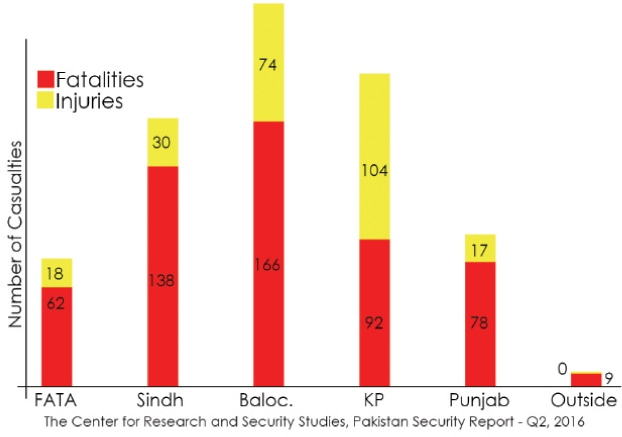
ISLAMABAD: A report launched by the Centre for Research and Security Studies (CRSS) claims that violence-related casualties have declined by 40pc in the second quarter of this year, as compared to the first quarter.
As many as 788 casualties – 545 fatalities and 243 injuries – were recorded between April 1 and June 30. No incidents of violence-related fatalities were reported from Islamabad, Azad Kashmir or Gilgit-Baltistan.
The head of the CRSS, Imtiaz Gul, told Dawn the improvement shows that due to pre-emptive intelligence gathering, groups involved in terrorism are not able to reorganise.
“Intelligence has been able to break the chain of command of major terrorist groups as we have been frequently hearing that the groups and members belonging to different terrorist organizations have been arrested,” he said.
10pc fall in violence-related fatalities in Balochistan, 75pc reduction in fatalities in Fata, think tank report finds
“Army has done the job of fire-fighting and now civil law enforcement agencies should come forward to play their role. So all the responsibility lies on the shoulders of civil law enforcement agencies,” he added.
In response to a question, Mr Gul explained that what he meant by civilian law enforcement was the implementation of existing legislation.
“Hate speech need to be stopped, there is need to take action against the illegal use of loud speakers, and materials which have been creating differences between different segments of society should be removed from the curriculum,” he said.
The report finds that 269 militants were killed in the aforementioned period, as well 270 non-combatants, including security officials and 172 civilians. Of the 72 security officials who died during this quarter, 46 were police officials, which count for over 60pc of the total fatalities of security officials in this period.
Balochistan saw a marginal decrease in violence-related causalities, and a nearly 10pc reduction – from 181 to 166 – in fatalities. Balochistan had the highest number of fatalities in this quarter.
A 75pc drop in fatalities was found in Fata compared to the first quarter, which 62 fatalities as compared to 239. Kurram Agency had the highest number of fatalities – 20 in the second quarter.
Khyber Pakhtunkhwa also saw a dercrease in violence, from 126 deaths to 94 in the second quarter – a decrease of 25pc. In Punjab, CRSS recorded a 50pc drop in violence.
Sindh also saw a reduction in fatalities in violence-related incidents, from 163 in the first quarter to 138 in the second quarter. Over the last three years, Karachi has become known for frequent targeted killings and other criminal activity, and the average number of fatalities per month last year was around 100. During the first six months of this year, the average has fallen to 48 fatalities per month, a reduction of over 50pc.
Violence incidents involving sectarian groups were only reported from KP (4) and Sindh (8) in this period, which is an 80pc reduction in sectarian violence.
The report states that these numbers paint “a rosy picture”, and the margin of improvement in the security sector should be noted, but adds: “This data suggests that the fight is far from over, and the unconditional implementation of rule of law should be the most paramount objective moving forward.”
Published in Dawn, July 28th, 2016











































Dear visitor, the comments section is undergoing an overhaul and will return soon.